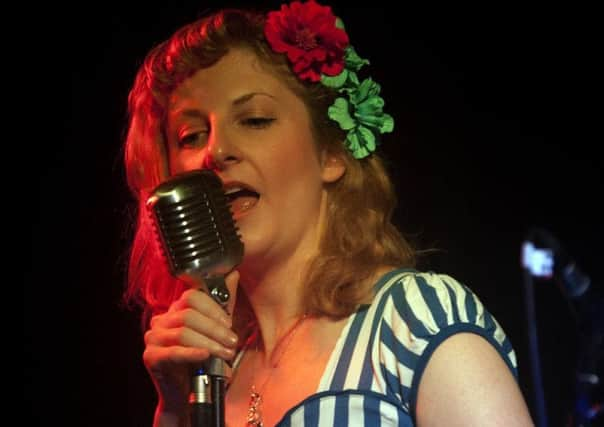Edinburgh Jazz Festival reviews: Alison Affleck / New Focus / Remembering Chet '“ and Gerry


Alison Affleck’s Copper Cats ****
George Square Spiegeltent
“And Now For Something Completely Different” could have been the title of the early evening concert given by Alison Affleck’s Copper Cats on Friday. Unlike any other gig in the jazz festival programme, this hour-long show drew almost exclusively from the early jazz and blues era – and did so from a woman’s point of view, giving a rare airing to songs by such pioneering women as Bessie Smith and Ma Rainey. Edinburgh-based American singer Alison Affleck’s informative and sassy introductions to the songs ensured the audience was receptive and entertained even before she began singing.
Despite her fairly stylised, slightly theatrical mannerisms, Affleck brought an authenticity to such ancient numbers as Downhearted Blues and A Good Man is Hard To Find. But where she particularly excelled was as a musical storyteller. St James Infirmary and The Black-Eyed Blues were stand-outs because Affleck didn’t just churn out the lyrics; she used them to bring the characters mentioned in these songs to life, and to create atmosphere and drama.
Advertisement
Hide AdAdvertisement
Hide AdOf course, she couldn’t have done all this as enjoyably without a good band playing with her; her piano-less quintet – boasting the crack team of Colin Steele (trumpet) and Dick Lee (clarinet) – did a terrific job of keeping the music swinging in suitably hot style.
ALISON KERR
New Focus ****
Rose Theatre
Formed a few years ago by established Scots jazzers, saxophonist Konrad Wiszniewski and pianist Euan Stevenson, to recreate the classic sax’n’strings Focus album by Stan Getz and Eddie Sauter, New Focus have since released two acclaimed albums of their own compositions, drawing on material from both for this concert, in the company of bassist Mario Caribe, drummer Alyn Cosker and the Glasgow String Quartet, as well as harp and flute.
They opened with a nod to their inspiration, the frenetic I’m Late from Getz’s 1961 album. In contrast, much of Wiszniewski and Stevenson’s own material was beguilingly mellow, such as the pastoral-sounding ballad Braeside, with its avian flute and richly pulsing piano and strings, and the impressionistic, Satie-esque perambulations of Ascension. Stevenson’s El Paraiso, from the first New Focus album, was one of several cinematic-sounding excursions, led off by Caribe’s stalking bass and similarly stealthy strings before tenor sax sighed in, while harp and piano ripples introduced the delicate ruminations of Parson’s Green before the piece accelerated, allowing Wiszniewski to let rip and Cosker to embark on a lengthy drum break.
There was scope for demonstrative drumming, too, in the apparently Bartok-inspired, no-nonsense hustle of Corea Change, which showcased Stevenson’s playing as well as a vigorous soprano sax break from Wiszniewski. This was a rewarding vindication of the sometimes uneasy amalgam of jazz and classical forces.
JIM GILCHRIST
Remembering Chet – and Gerry ****
Rose Theatre
The deservedly popular tribute group Remembering Chet – a swinging trio with Iain Ewing (vocals) and Colin Steele (trumpet) reflecting the twin facets of the late, great Chet Baker’s music-making, and Euan Stevenson (piano) accompanying them – has been a staple of the last few Edinburgh Jazz Festivals.
For this year’s event, on Saturday lunchtime, the band added a new dimension by bringing baritone saxophonist Billy Fleming into the mix, thus allowing them to broaden the programme out to include some of the classic numbers Baker recorded with Gerry Mulligan in the 1950s.
It certainly gave the group – which, Ewing explained, he had been about to retire – a new lease of life; Fleming’s graceful baritone forming a formidable front line with the ever-eloquent Steele trumpet, notably in their unaccompanied climax to Bernie’s Tune, one of the compositions famously recorded by Baker and Mulligan’s radical piano-less quartet but here benefitting also from Euan Stevenson’s elegant keyboard skills.
Advertisement
Hide AdAdvertisement
Hide AdEwing – like Steele on trumpet – did his usual terrific job of stylishly channelling the Baker hallmarks – wistfulness, a soft, gentle tone, simplicity and vulnerability – while avoiding sounding like an impersonator. The many highlights included I Get Along Without You Very Well, which featured an exquisite, Satie-esque accompaniment from Euan Stevenson.
ALISON KERR